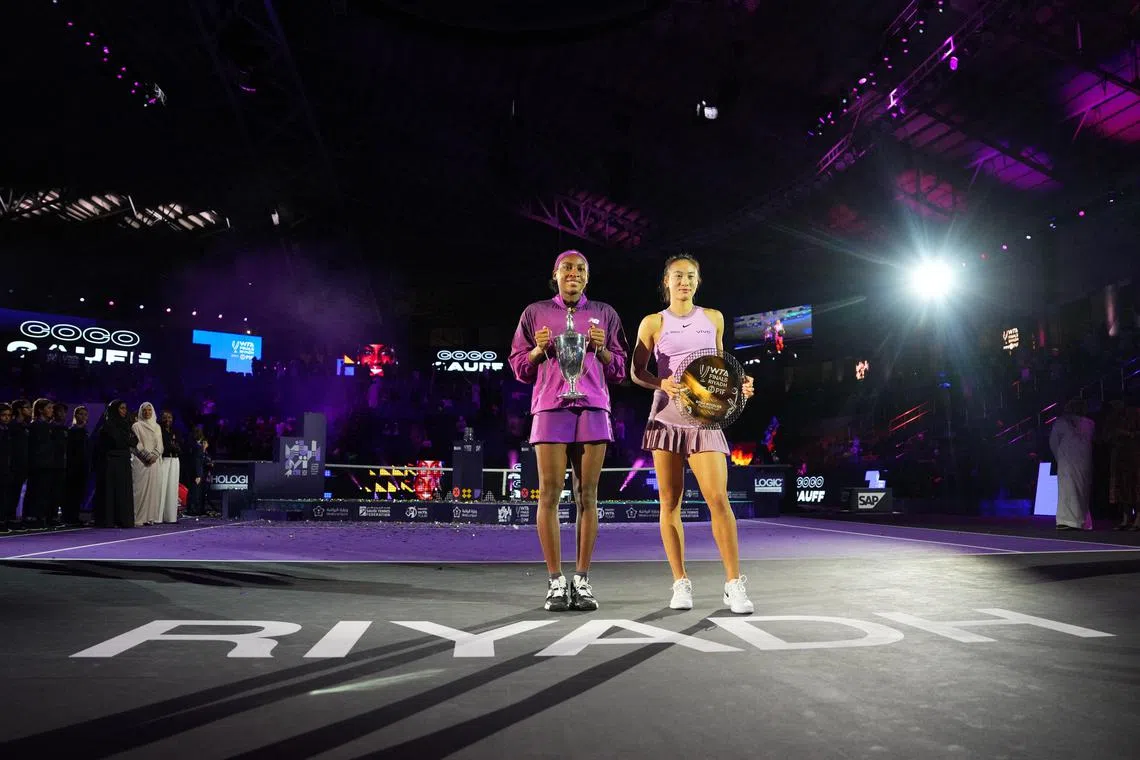Change the game: Saudi Arabia takes a stride into women’s tennis
Sign up now: Get the biggest sports news in your inbox

Coco Gauff (left) of the US celebrating with the trophy after winning the women's singles final on Nov 9.
PHOTO: REUTERS
Follow topic:
RIYADH – The sell-out crowd was bathed in purple light and the screens ringing the stadium flashed a countdown to a club beat. The latest conquest in Saudi Arabia’s unstoppable advance into the world of sports – football, golf, boxing, motor racing, now tennis – was about to begin. The Women’s Tennis Association (WTA) Finals had come to Riyadh.
For one night, the capital of an authoritarian, conservative kingdom where progress on women’s rights is still stop-and-go was about to be home to one of the most prestigious events in women’s tennis.
“Change the game,” an announcer intoned just before the players in the singles final, American Coco Gauff and China’s Zheng Qinwen, emerged on court to huge cheers from the crowd, which included many Saudi women.
“Redefine power.” In another place, those words might have come off as little more than a girl-power slogan for women’s sports. But in Saudi Arabia on Nov 9, it was the host country redefining who held power in women’s tennis and beyond.
For years now, Crown Prince Mohammed bin Salman, the country’s de facto ruler, has used oil riches to remake his staid kingdom into a global player with glitz to match, pairing tectonic social changes with intensifying repression.
Sports are a major part of the crown prince’s transformational push. Saudi Arabia muscled into professional golf by pouring US$2 billion (S$2.68 billion) into an upstart competitor to the PGA Tour, which disdained LIV Golf before eventually deciding to partner with it.
The country burst onto the international football scene by purchasing the English Premier League team Newcastle United, luring some of the biggest names to the Saudi Pro League and leading the race as the sole bidder to host the 2034 World Cup.
Moving into tennis, Saudi Arabia recently hosted the Six Kings Slam, an exhibition showcasing the top men’s players.
It also struck a three-year deal with the financially struggling WTA to bring its Finals to Riyadh, partly with the promise of awarding some US$15 million in prize money in 2024. Those are the highest winnings in women’s tennis, satisfying players’ demands for prize parity with men.
More professional tennis events are likely to follow.
With every move has come controversy over the kingdom’s human rights record. But last weekend, the power of what Saudi Arabia has bought itself – and the excitement the changes are generating at home – was there for all to see.
Gauff had publicly weighed the pros and cons of playing in Saudi Arabia in remarks before arriving there, saying that she looked forward to promoting the sport in a new place while expressing reservations about the country’s record on LGBTQ+ and women’s rights. But she stuck to the positive in a news conference after winning the final, declaring the event a success that would inspire young Saudis.
“Just to show young girls that, you know, their dreams are possible, I’m literally no different than they are. We just maybe come from different places,” Gauff said.
Saudi girls had not had the chance to watch professional tennis events in their own country, the way she had done when she was young, she added. But now that had changed.
Some women’s tennis players and officials have embraced the chance to boost the sport in a new country (and bring in revenue aplenty from a host with means). Others, including several of the biggest stars, have criticised the WTA’s decision on human rights grounds.
“We lost our moral high ground when the women decided to go there. You have to show me some progress first. Women have to be equal citizens under the law. Otherwise, we might as well play in North Korea,” tennis legend Martina Navratilova told The New York Times in October.
Saudi women are driving, entering the workforce and moving out on their own in record numbers after changes put in place by Crown Prince Mohammed. But they still need the permission of a male guardian to marry.
Homosexuality remains criminalised, something that has come under particular fire in a sport with a ground-breaking history of openly LGBTQ+ champions.
And the kingdom’s image still bears the taint of the gruesome killing in 2018 of Jamal Khashoggi, a Washington Post columnist who occasionally criticised the Saudi government, which US intelligence agencies later concluded had been ordered by Crown Prince Mohammed.
The dark side of its transformation has led many critics to accuse the kingdom of “sportswashing,” paying to associate itself with high-profile athletes and popular events to distract from its rights record. The Saudi government has rejected such allegations.
But many Saudis, especially young ones, are thrilled that new options for work, for fun, for mingling with the opposite sex, for wearing what they want and so much more are opening up at a pace that would have been impossible just a decade ago. NYTIMES

